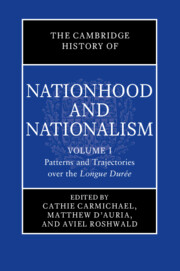Book contents
- The Cambridge History of Nationhood and Nationalism
- The Cambridge History of Nationhood and Nationalism
- The Cambridge History of Nationhood and Nationalism
- Copyright page
- Contents
- Figures
- Contributors
- General Introduction
- Part i The Politics of Ethnicity, Nationhood, and Belonging in the Settings of Classical Civilizations
- Part ii Paradigm Shifts and Turning Points in the Era of Globalization, 1500 to the Present
- 7 Colonial Expansion and the Making of Nations: The Spanish Case
- 8 The Reformation and National Identity
- 9 Europe’s Eighteenth Century and the Quest for the Nation’s Origins
- 10 Empire, War, and Racial Hierarchy in the Making of the Atlantic Revolutionary Nations
- 11 The Rise of the Charismatic Nation: Romantic and Risorgimento Nationalism, Europe, 1800–1914
- 12 Revolution and Independence in Spanish America
- 13 A Tale of Two Cities: The American Civil War
- 14 The Cycle of Inevitability in Imperial and Republican Identities in China
- 15 Colonial Subjects and the Struggle for Self-Determination, 1880–1918
- 16 The First World War
- 17 Anticolonialism and Nationalism in the French Empire
- 18 Patriotism in the Second World War: Comparative Perspectives on Countries under Axis Occupation
- 19 Decolonization and the Cold War
- 20 1968: The Death of Nationalism?
- Conclusion to Part II
- Index
- References
11 - The Rise of the Charismatic Nation: Romantic and Risorgimento Nationalism, Europe, 1800–1914
from Part ii - Paradigm Shifts and Turning Points in the Era of Globalization, 1500 to the Present
Published online by Cambridge University Press: 27 October 2023
- The Cambridge History of Nationhood and Nationalism
- The Cambridge History of Nationhood and Nationalism
- The Cambridge History of Nationhood and Nationalism
- Copyright page
- Contents
- Figures
- Contributors
- General Introduction
- Part i The Politics of Ethnicity, Nationhood, and Belonging in the Settings of Classical Civilizations
- Part ii Paradigm Shifts and Turning Points in the Era of Globalization, 1500 to the Present
- 7 Colonial Expansion and the Making of Nations: The Spanish Case
- 8 The Reformation and National Identity
- 9 Europe’s Eighteenth Century and the Quest for the Nation’s Origins
- 10 Empire, War, and Racial Hierarchy in the Making of the Atlantic Revolutionary Nations
- 11 The Rise of the Charismatic Nation: Romantic and Risorgimento Nationalism, Europe, 1800–1914
- 12 Revolution and Independence in Spanish America
- 13 A Tale of Two Cities: The American Civil War
- 14 The Cycle of Inevitability in Imperial and Republican Identities in China
- 15 Colonial Subjects and the Struggle for Self-Determination, 1880–1918
- 16 The First World War
- 17 Anticolonialism and Nationalism in the French Empire
- 18 Patriotism in the Second World War: Comparative Perspectives on Countries under Axis Occupation
- 19 Decolonization and the Cold War
- 20 1968: The Death of Nationalism?
- Conclusion to Part II
- Index
- References
Summary
A specific type of nationalism developed in Europe in the first half of the nineteenth century. It differed from New World nationalisms (in the tradition of George Washington, Toussaint Louverture and Simón Bolívar) in a number of respects. It was spearheaded to a large extent by writers, artists, and intellectuals (in the fields of cultural production and knowledge production) rather than by political and popular activists; as such it affected existing states and newly emergent nations alike; and its main impact was through the reconceptualization of the state, its self-image, and its institutions, rather than through popular mobilization. Its main tenet – that the state should reflect, and indeed be defined by, the ethnocultural nationality of its inhabitants – was applied in the Peace Treaties of 1919 as an overriding principle in international law (the peoples’ right to self-determination) and still informs our current assumption that the default state is the “nation-state.”
- Type
- Chapter
- Information
- The Cambridge History of Nationhood and Nationalism , pp. 231 - 255Publisher: Cambridge University PressPrint publication year: 2023



